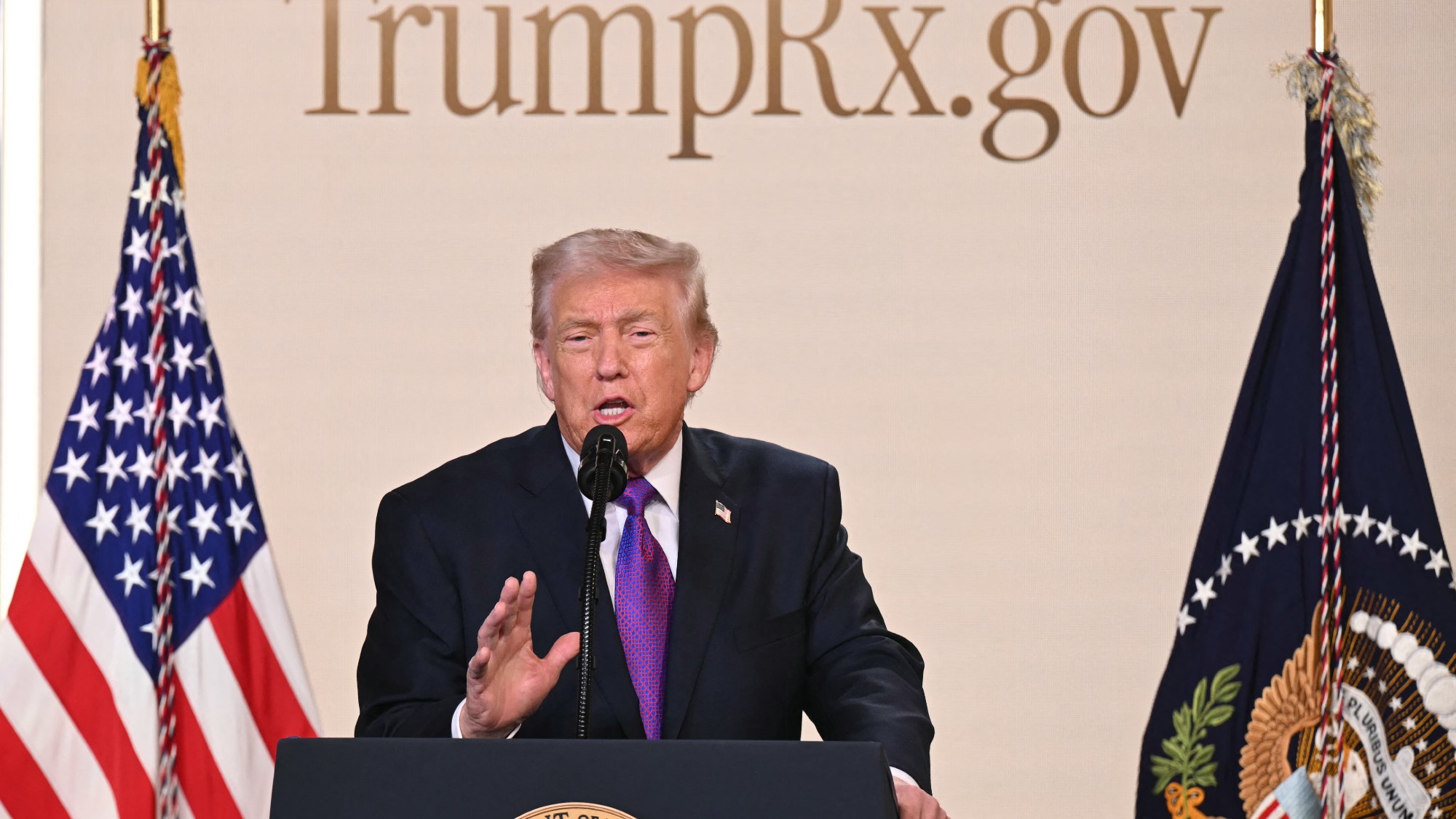Party like it’s 1997: can Tories stop a Labour landslide?
Conservatives suffer heavy local election losses while Keir Starmer predicts a majority at next general election

A free daily email with the biggest news stories of the day – and the best features from TheWeek.com
You are now subscribed
Your newsletter sign-up was successful
Labour’s strong showing in the local elections has led some to suggest the party could be on track for a 1997-style landslide victory at the next general election.
Prime Minister Rishi Sunak woke up to news that his “party was on the ropes across the country”, said the Financial Times, with Labour “making inroads in the north and Midlands, and the Liberal Democrats advancing in rich areas of the south”.
Early results suggested the Conservatives could lose as many as 1,000 council seats, matching the party’s “most pessimistic predictions”.
The Week
Escape your echo chamber. Get the facts behind the news, plus analysis from multiple perspectives.

Sign up for The Week's Free Newsletters
From our morning news briefing to a weekly Good News Newsletter, get the best of The Week delivered directly to your inbox.
From our morning news briefing to a weekly Good News Newsletter, get the best of The Week delivered directly to your inbox.
Labour has won control of councils in Plymouth, Medway and Stoke-on-Trent – key targets for the party at the next general election – while Liberal Democrats have taken control of Windsor and Maidenhead in a result that leader Ed Davey called “groundbreaking”, according to BBC News.
Labour have also taken East Staffordshire from the Conservatives for the “first time in decades”, and are “in shock”, reported BBC Radio Derby’s Georgia Roberts. “This was beyond many of their wildest hopes,” she said.
“We are on course for a Labour majority at the next general election,” Labour leader Keir Starmer said while visiting Chatham, in Kent, home to the new Labour council of Medway.
For the Tories, Sunak acknowledged the “disappointing” results, while insisting that his party was making progress in “key election battlegrounds”.
A free daily email with the biggest news stories of the day – and the best features from TheWeek.com
What did the papers say?
“The Tories will fear this is the darkest hour before another new Labour dawn next year,” said Sky News’ chief political correspondent, Jon Craig. “From the South West and South East of England to the Midlands and the North, the overnight results have been disastrous for the Conservatives.”
Many of their worst results were in the so-called Red Wall and pro-Brexit areas like Stoke-on-Trent, he added. “That will be a massive relief” for Starmer, while Liberal Democrats “look poised to snatch more seats” in so-called affluent southern Blue Wall areas.
“What will worry the [Conservative] party’s high command is that Nigel Farage’s vote in 2019 appears to have gone back to Labour, not the Tories,” said Craig.
“Labour are in a very good mood this morning,” wrote the BBC’s chief political correspondent, Nick Eardley. But claims of a future majority “assume a significant revival in Scotland”, which is “not inevitable” as Labour currently only has one seat there.
It is also based on the assumption of success in Wales and London, he added.
While local elections are “a good barometer” of the public mood, they do not predict who will be successful in a general election, said the i news site’s policy editor Jane Merrick.
In May 2017, the Conservatives gained 563 council seats compared with Labour’s 382 losses, which “triggered optimism” in Downing Street. But the results “did not tell the full story of public opinion”, and a month later voters “appeared to punish the Tories for forcing what many saw as an unnecessary general election”, leading to the party losing its majority.
In 2019, dismal local election results for Conservatives “contradicted the general election outcome six months down the line”, she said, hastening Theresa May’s resignation. But Labour’s highly successful local election results in 1996 “were a good predictor of the following year’s landslide for Tony Blair”.
While most votes were still being counted this morning, “what we can say is that it has been a very bad night for the Conservative party”, wrote Stephen Bush for the Financial Times’ Inside Politics newsletter. “What’s less clear is what it means for everyone else.”
The Tory general election victories in 1992 and 2015 were predictable “given the state of the parties in the local elections that took place the previous year”, he wrote. “One thing we can say with a reasonable degree of certainty is that the Conservative party is doing much worse than in 1991 or 2014.”
What next?
“My sense,” Bush said, based on results to that point, “is that we are heading for a result that looks a bit like the 2010 general election.”
But “one of the most robust findings in political science” is that the governing party “tends to recover some lost ground” in the run-up to an election.
Labour’s performance “is not what an opposition party hoping to win an election would hope for either”, Bush said, although the party does better at general elections as it “squeezes votes” from the Liberal Democrats.
Conservative MPs with smaller majorities “will be in a cold sweat”, said Sky News’s Craig, but results still to come “mostly in the shires and districts” should be better for the Conservatives than the mostly urban areas declared overnight.
Early results suggest Starmer “still has work to do to be confident in winning an outright majority”, said the Financial Times, as the gains were shared with the Lib Dems and the Green Party.
While “it is always risky to read into a set of local election results what will happen at the next general election”, Conservative elections expert Lord Hayward told i news, it is “absolutely right to say there is an impact on morale on party hierarchies and leadership, and on members.
“You cannot stop morale being impacted by particular gains and losses. That is a natural human reaction.”
Harriet Marsden is a senior staff writer and podcast panellist for The Week, covering world news and writing the weekly Global Digest newsletter. Before joining the site in 2023, she was a freelance journalist for seven years, working for The Guardian, The Times and The Independent among others, and regularly appearing on radio shows. In 2021, she was awarded the “journalist-at-large” fellowship by the Local Trust charity, and spent a year travelling independently to some of England’s most deprived areas to write about community activism. She has a master’s in international journalism from City University, and has also worked in Bolivia, Colombia and Spain.
-
 Democrats seek calm and counterprogramming ahead of SOTU
Democrats seek calm and counterprogramming ahead of SOTUIN THE SPOTLIGHT How does the party out of power plan to mark the president’s first State of the Union speech of his second term? It’s still figuring that out.
-
 Climate change is creating more dangerous avalanches
Climate change is creating more dangerous avalanchesThe Explainer Several major ones have recently occurred
-
 What’s TrumpRx and who is it for?
What’s TrumpRx and who is it for?The Explainer The new drug-pricing site is designed to help uninsured Americans
-
 How are Democrats turning DOJ lemons into partisan lemonade?
How are Democrats turning DOJ lemons into partisan lemonade?TODAY’S BIG QUESTION As the Trump administration continues to try — and fail — at indicting its political enemies, Democratic lawmakers have begun seizing the moment for themselves
-
 How did ‘wine moms’ become the face of anti-ICE protests?
How did ‘wine moms’ become the face of anti-ICE protests?Today’s Big Question Women lead the resistance to Trump’s deportations
-
 How are Democrats trying to reform ICE?
How are Democrats trying to reform ICE?Today’s Big Question Democratic leadership has put forth several demands for the agency
-
 Why is Tulsi Gabbard trying to relitigate the 2020 election now?
Why is Tulsi Gabbard trying to relitigate the 2020 election now?Today's Big Question Trump has never conceded his loss that year
-
 How long can Keir Starmer last as Labour leader?
How long can Keir Starmer last as Labour leader?Today's Big Question Pathway to a coup ‘still unclear’ even as potential challengers begin manoeuvring into position
-
 Will Democrats impeach Kristi Noem?
Will Democrats impeach Kristi Noem?Today’s Big Question Centrists, lefty activists also debate abolishing ICE
-
 Do oil companies really want to invest in Venezuela?
Do oil companies really want to invest in Venezuela?Today’s Big Question Trump claims control over crude reserves, but challenges loom
-
 What is China doing in Latin America?
What is China doing in Latin America?Today’s Big Question Beijing offers itself as an alternative to US dominance